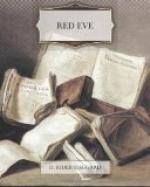“How did this sickness begin in Avignon?” asked Grey Dick.
“Noble Squire, none know for certain. In the autumn we had great rains, heavy mists and other things contrary to the usual course of nature, such as strange lights shining in the heavens, and so forth. Then after a day of much heat, one evening a man clad in a red and yellow cap, who wore a cloak of thick black furs and necklaces of black pearls, was seen standing in the market-place. Indeed, I saw him myself. There was something so strange and dreadful about the appearance of this man, although it is true that some say he was no more than a common mountebank arrayed thus to win pence, that the people set upon him. They hurled stones at him, they attacked him with swords and every other weapon, and thought that they had killed him, when suddenly he appeared outside the throng unhurt. Then he stretched out his white-gloved hand toward them and melted into the gloom.
“Only,” added Basil nervously, “it was noted afterward that all those who had tried to injure the man were among the first to die of the pest. Thank God, I was not one of them. Indeed I did my best to hold them back, which, perhaps, is the reason why I am alive to-day.”
“A strange story,” said Hugh, “though I have heard something like it in other cities through which we have passed. Well, till to-morrow at this hour, friend Basil.”
“We have learned two things, master,” said Dick, when the lawyer had bowed himself out. “First, that Acour is, or has been, in Avignon, and secondly, that Murgh the Messenger, Murgh the Sword, has been or is in Avignon. Let us go seek for one of the other of them, since for my part I desire to meet them both.”
So all that day they sought but found neither.
Next morning Basil reappeared, according to his promise, and informed them that their business was on foot. Also he said that it was likely to prove more difficult than he anticipated. Indeed, he understood that he who was named de Noyon and Cattrina, having friends among the cardinals, had already obtained some provisional ratification of his marriage with the lady Eve Clavering. This ratification it would now be costly and difficult to set aside.
Hugh answered that if only he could be granted an audience with his Holiness, he had evidence which would make the justice of his cause plain. What he sought was an audience.
The notary scratched his lantern jaws and asked how that could be brought about when every gate of the palace was shut because of the plague. Still, perhaps, it might be managed, he added, if a certain sum were forthcoming to bribe various janitors and persons in authority.
Hugh gave him the sum out of the store of gold they had taken from the robbers in the mountains, with something over for himself. So Basil departed, saying that he would return at the same hour on the morrow, if the plague spared him and them, his patrons, as he prayed the Saints that it might do.




